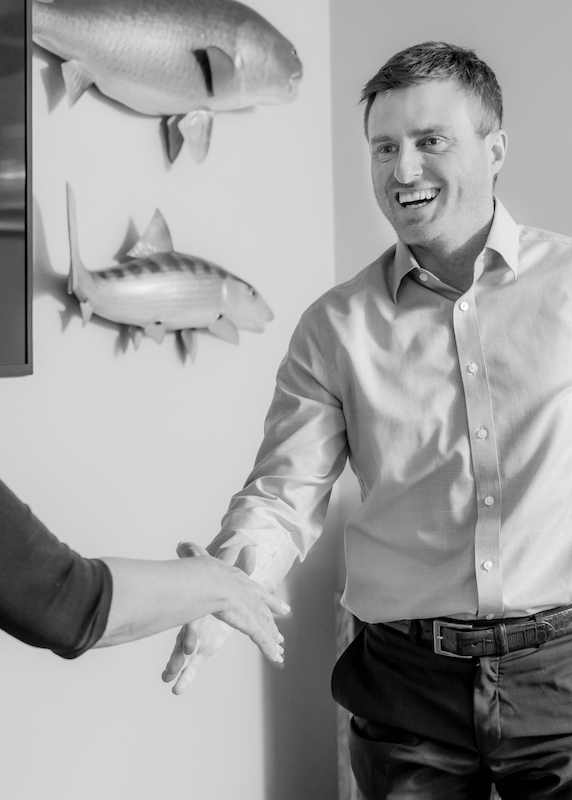I’ve heard all the jokes, the “ambulance chaser” references, the faking injuries, etc. It doesn’t bother me on a personal level, but it is disappointing to the extent that people genuinely don’t understand what a personal injury lawyer does to help people.
Personal injury lawyers represent people, in our case Montanans, who are fighting insurance companies. When it comes down to Montanan versus insurance companies, you would think public sentiment would side with Montanans.
Yet, somehow insurance companies have effectively convinced many people that you should not support your fellow Montanan in their fight against insurance companies. It’s a classic David v. Goliath fight, and yet Goliath is the fan favorite. The anti-lawyer public sentiment is generally the result of effective insurance company propaganda, and also some unfortunate and admittedly cringe-worthy advertising by some personal injury lawyers.
Hopefully this article can help educate as to the necessity of the personal injury lawyer.
What do Personal Injury Lawyers Do?
Personal injury lawyers help people recover money when they are injured as a result of another party’s negligence. In general, the other party must be legally negligent (failed to use reasonable care) at a minimum before there is a legal claim. Frivolous lawsuits do not succeed and are quickly dismissed, so any claim that there’s a flood of frivolous cases is downright nonsense. Only legitimate claims succeed in court.

Personal injury cases are about accountability. The person who causes the harm (negligently), must pay for the harm. If you break it, you buy it.
Yes, it is about money. Our society places a monetary value on things, and that is how we as a modern and civilized society have decided to measure things. Art costs money, cars cost money, and yes, humans cost money. When someone is negligently injured, the negligent party pays for medical bills, lost wages, etc. We do not do an “eye for an eye,” instead we have a system where justice and compensation is measured in money. If you take something from someone, you make up for it with money, which accomplishes fairness and accountability as best as it can be accomplished.
For instance, a textbook personal injury case involves someone suffering some degree of injury as a result of another’s negligence. Think drunk driver hitting and hurting someone. Injuries affect people in various ways, and often include consequences like medical bills, lost income, and lost ability to have the same life as before. These things cost money, and the question is: who should have to pay for it? The person whose fault it was (drunk driver)? Or the person whose fault it was NOT? The law recognizes that a functioning and civilized society requires that the person whose fault it was pays for the consequences.
The Role of Insurance for Personal Injury Lawyers
Insurance runs the show. The vast majority of personal injury cases revolve around insurance coverage. Personal injury lawyers must understand insurance coverage in and out. Yet, because of the law in Montana, insurance companies often get to remain in the dark for cases, giving the illusion that a Montanan is being sued and will have to pay out of pocket (though that happens, in our experience it is incredibly rare). Rule 411 of the Montana Rules of Evidence prevents the introduction of insurance coverage in most cases.
Here’s an example of the classic case. Drunk driver (John) swerves over the center line and hits innocent driver (Tom). Tom is hurt, and incurs medical bills, lost wages, and suffering. In order to recover for Tom’s losses, he must sue John, because John was negligent. Under the law, Tom must sue John directly, so John the person is named as defendant. Make no mistake, John is in fact the legally liable party. Wait – but I said personal injury cases are the Montanan versus insurance companies?
Here’s how it works. Assuming John has liability insurance (legally required in Montana), his liability insurer must pay for the damage he caused, up to the limit. Since it is the insurance company that has to pay , the insurance company makes the decisions. Certainly John plays a role, but his insurance company will be the one to hire the lawyer, instruct the lawyer, and decide on payment/settlement. So for all intents and purposes, it is indeed the Montanan (Tom) versus insurance company.
The above example is a simple car accident, involving car insurance. Other cases might involve different types of liability insurance. For example, a construction injury might involve CGL coverage, medical malpractice would involve malpractice coverage, etc. Regardless of the context, the liability insurer calls the shots, and is who you are really fighting in most cases.
Now to be clear, the actual defendant (above, John) is the legally liable party. Any judgment against John is against him the person, and can theoretically be recovered. But his liability insurer must pay, up to the limit.
What if the limit is not enough? As a practical matter, most personal injury lawyers choose to only pursue cases up to the applicable insurance limit. Technically, John is personally responsible for any judgment above the limit, or for any judgment if he fails to have insurance. But it’s often not viable to pursue recovery against uninsured people, thus we at Duckworth Law almost never do so. Again, the vast majority of personal injury cases, and every case this firm has handled, is Montanan versus an insurance company.
Personal Injury lawyers Fighting Insurance Companies
Insurance companies have massive resources. They can hire teams of lawyers, and money is never an object. They don’t have to settle with you, even if they know they should. They can easily drag it out for months or years, even if they know they will eventually have to pay something.
Moreover, insurance companies have classic maneuvers they will employ in most cases. They will call or imply that you are a liar, they will call or imply that your family is lying, they will call you weak, an exaggerator, and hold anything they can against you. Personal injury cases are not fun, because insurance companies know if they make it miserable they can discourage legitimate claims. Expect to be attacked.
Make no mistake, fighting insurance companies is a battle. Though it’s never easy, a good personal injury lawyer will be willing to fight. We will be at a resource disadvantage; they have more money and more time. But we have some things that insurance companies don’t have: we are willing to fight, and we are humans and understand real human impact. Nothing scares insurance companies more than the truth about the human story. No amount of money or resources can erase the human story.
Personal Injury Lawyers and Attorney Fees
Personal injury lawyers get paid, there’s no reason to deny or shy away from that fact. Lawyers, like other workers, get paid for their work. When someone gets hurt due to negligence, and the lawyer recovers money for the person, the lawyer gets paid. Just like the EMT’s got paid for responding to the crash, just like the doctor got paid for managing the injuries in the ER, just like the hospital got paid for the MRI, the tow company for towing the car, and the body shop that fixed the cars. People, including attorneys, get paid for good work.

Personal injury fees were explained in a separate blog post. To summarize, cases are done on a contingent fee, and that’s the only way the system works. Most victims cannot pay out of pocket, and the fee must be high enough for lawyers to justify the work. Cases are no guarantee, many are lost, and you are signing up to fight billion dollar insurance companies. If attorneys aren’t paid well, they cannot take cases, and insurance companies run rough shod over the justice system.
Without personal injury lawyers, our justice system would fail to achieve true accountability. When someone gets hurt, whoever negligently or intentionally caused the injury should pay for it. This doesn’t mean there is always a case, because oftentimes there is no case. If it’s the person’s own fault they got hurt, they have to pay for their own injury.
But if it’s someone else’s fault, who was negligent, and that person has insurance coverage, that person’s insurance must pay. That’s how you achieve a functioning and accountable justice system. And yes, personal injury lawyers get paid to make sure the appropriate party pays for the damage.
Conclusion
Don’t fall for the insurance company propaganda. Support your fellow Montanan against some insurance company. Lawyers aren’t all bad. Accountability is a cornerstone of justice in America.
What continues to amaze me is that I hear constantly from clients (meaning people I represent who are injured) that they are “anti-lawsuit” and that “I am not the suing type.” In fact, the people who are the most adamant “anti-lawsuit” people, are the ones who often feel the most strongly that their case is legitimate and more just, even though there their case is a run of the mill personal injury claim. They are buying the insurance company propaganda, just not when it applies to them.
In other words, they remain against personal injury cases in general, thinking that everyone else’s claims are frivolous, whereas theirs is somehow more noble. When the reality is that their case is no different than the 100’s of other cases I have handled. It is lazy and flawed thinking. Lawsuits for legitimate bad acts, and with legitimate injuries, are how we function in a civilized society. Personal injury lawyers play a key role.
Hopefully this article sheds some light on the civil justice system, and personal injury lawyers. If you have any questions, please call us as Duckworth Law.

